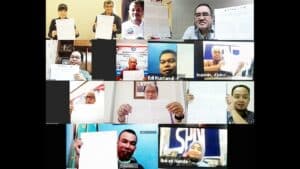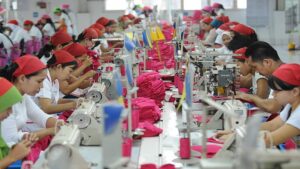The COVID-19 pandemic has threaten the health and livelihoods of workers and employers around the world, including Indonesia. The Indonesian employers and workers from the garment and footwear industries have opted to join forces to overcome the impact of the pandemic.
The Indonesian employers’ associations and trade unions related to export-oriented garment and footwear industries signed a joint commitment to protect health, business sustainability and welfare of workers in these sectors. The virtual signing ceremony, held in Jakarta on 6 August, also marked the joint response taken by the employers and workers against the COVID-19 pandemic .

The joint commitment was signed by the Indonesian Employers’ Association (Apindo), the Indonesian Textile Association (API) and the Indonesian Footwear Association (Aprisindo) representing the employers. From the worker’s side, it was signed by the Federations of Textile, Clothing and Leather Unions of the Confederation of All Indonesian Workers Union (FSP-TSK KSPSI) and of Confederation of Indonesian Trade Union (FSP-TSK KSPI) as well as the Federation of Garment, Handicraft, Textile and Industrial Centers of the Indonesian Labour Union Confederation (FSB-Garteks KSBSI).
Drawing upon the impact of the COVID-19 pandemic to the world of work, particularly to the garment and footwear industries, the joint statement promotes compliance with occupational safety and health and COVID-19 related guidelines and upholds social dialogues to overcome common employment issues.
This national joint commitment is a follow-up to the ILO Call for Action: Action in Global Garment Industry , initiated by the International Organization of Employers (IOE), the International Confederation of Trade Union (ITUC) and the ILO. The global action calls for work on sustainable systems of social protection for a more just and resilient garment industry.
Both Sinta Widjaja Kamdani, Deputy of Apindo, and Elly R. Silaban, President of KSBSI, emphasized the importance of the joint commitment to ensure the sustainability of the Indonesian export-oriented garment and footwear industries as one key pillar of the country’s economic fabric. They both also expressed the replication of this joint commitment by other industrial sectors to help the economic recovery.
“We want to show our international buyers that we are dealing with this issue together and we are committed to follow the new protocols for the benefits of both workers and employers,” said Shinta; while Elly, echoing the same commitment, stated that “this is our togetherness and our joint responses to overcome the challenges that we are jointly facing.”

The Ministry of Manpower greatly appreciated the joint commitment shown by both employers and workers. “Social dialogue is the key for businesses’ continuity and resilience in the face of pandemic. This is also in line with the initiatives of the government as we need the support of both employers and workers in implementing governmental programmes,” stated Haiyani Rumondang, Manpower Ministry’s Director General for Industrial Relations and Social Protection.
Similar appreciation were also given by the representatives of the IOE and ITUC who witnessed the signing ceremony. “We witness the fragility of businesses affecting both workers and employers. This joint commitment is a step to realize a brighter world of work,” said Shoya Yoshida, Deputy Secretary General of ITUC; while Matthias Thorns, Deputy Secretary General, stated,”Social dialogue is the key and everybody is on board to tackle the impact of the COVID-19 pandemic.”
In Indonesia, the joint commitment was facilitated by the Better Work Indonesia (BWI) programme , a joint programme of the ILO and the International Finance Corporation (IFC). The programme aims to improve working conditions and boost competitiveness of the Indonesian garment and footwear industries.